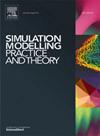移动物联网边缘计算网络时空延迟优化的多目标深度强化学习算法
IF 3.5
2区 计算机科学
Q2 COMPUTER SCIENCE, INTERDISCIPLINARY APPLICATIONS
引用次数: 0
摘要
移动物联网(IoT)设备的快速增长需要新的计算框架。这些框架必须满足边缘和移动边缘计算(MEC)系统中严格的延迟和能效要求。包括边缘服务器位置和任务调度时间在内的时空动态构成了一个复杂的优化问题。物联网工作负载的异质性和设备移动性所带来的限制进一步加剧了这些挑战。计算开销和通信挑战之间的平衡也是一个问题。为了解决这些问题,需要在移动物联网和边缘计算环境中采用先进的资源管理和动态任务调度方法。在本文中,我们提出了一种深度强化学习(DRL)多目标算法,称为双深度q -学习(DDQN)框架,该框架增强了用于联邦边缘计算网络的时空移动预测、延迟感知任务卸载和能量约束物联网设备轨迹优化。选择DDQN是因为它具有最优的稳定性和较低的q值高估。该框架采用奖励驱动的优化模型,该模型动态地对延迟敏感的任务进行优先级排序,最大限度地减少任务迁移开销,并在设备和边缘服务器之间平衡能源效率。它集成了动态资源分配算法,以解决随机任务到达模式和实时计算需求。仿真表明,与基准算法相比,端到端延迟减少了35%,能源效率提高了28%,截止日期遗漏率降低了20%。本文章由计算机程序翻译,如有差异,请以英文原文为准。
A multi-objective deep reinforcement learning algorithm for spatio-temporal latency optimization in mobile IoT-enabled edge computing networks
The rapid increase in Mobile Internet of Things (IoT) devices requires novel computational frameworks. These frameworks must meet strict latency and energy efficiency requirements in Edge and Mobile Edge Computing (MEC) systems. Spatio-temporal dynamics, which include the position of edge servers and the timing of task schedules, pose a complex optimization problem. These challenges are further exacerbated by the heterogeneity of IoT workloads and the constraints imposed by device mobility. The balance between computational overhead and communication challenges is also a problem. To solve these issues, advanced methods are needed for resource management and dynamic task scheduling in mobile IoT and edge computing environments. In this paper, we propose a Deep Reinforcement Learning (DRL) multi-objective algorithm, called a Double Deep Q-Learning (DDQN) framework enhanced with Spatio-temporal mobility prediction, latency-aware task offloading, and energy-constrained IoT device trajectory optimization for federated edge computing networks. DDQN was chosen for its optimize stability and reduced overestimation in Q-values. The framework employs a reward-driven optimization model that dynamically prioritizes latency-sensitive tasks, minimizes task migration overhead, and balances energy efficiency across devices and edge servers. It integrates dynamic resource allocation algorithms to address random task arrival patterns and real-time computational demands. Simulations demonstrate up to a 35 % reduction in end-to-end latency, a 28 % improvement in energy efficiency, and a 20 % decrease in the deadline-miss ratio compared to benchmark algorithms.
求助全文
通过发布文献求助,成功后即可免费获取论文全文。
去求助
来源期刊

Simulation Modelling Practice and Theory
工程技术-计算机:跨学科应用
CiteScore
9.80
自引率
4.80%
发文量
142
审稿时长
21 days
期刊介绍:
The journal Simulation Modelling Practice and Theory provides a forum for original, high-quality papers dealing with any aspect of systems simulation and modelling.
The journal aims at being a reference and a powerful tool to all those professionally active and/or interested in the methods and applications of simulation. Submitted papers will be peer reviewed and must significantly contribute to modelling and simulation in general or use modelling and simulation in application areas.
Paper submission is solicited on:
• theoretical aspects of modelling and simulation including formal modelling, model-checking, random number generators, sensitivity analysis, variance reduction techniques, experimental design, meta-modelling, methods and algorithms for validation and verification, selection and comparison procedures etc.;
• methodology and application of modelling and simulation in any area, including computer systems, networks, real-time and embedded systems, mobile and intelligent agents, manufacturing and transportation systems, management, engineering, biomedical engineering, economics, ecology and environment, education, transaction handling, etc.;
• simulation languages and environments including those, specific to distributed computing, grid computing, high performance computers or computer networks, etc.;
• distributed and real-time simulation, simulation interoperability;
• tools for high performance computing simulation, including dedicated architectures and parallel computing.
 求助内容:
求助内容: 应助结果提醒方式:
应助结果提醒方式:


